Carpe Glitter Read online
Page 2
When I squinted at it, holding it in a sunbeam coming in through the window, I saw it was swastikas and lightning bolts, an interlocking pattern. Graceful in its design, but I had the same reaction to it that war and other atrocities always evoked, a twist of nausea at the pit of my stomach.
Some war souvenir Day had collected? The hand had a scientific feel to it, and I remembered that Day had spied on German scientists, infiltrated them, pretending to be a Nazi sympathizer. Perhaps it was a working model, a prototype of some sort, rather than art object?
The stump was sealed off with a metal cap set with fine, deep grooves. It felt odd in my grip. Loose, as though its center of gravity kept changing. And as though it might move at any moment, might twitch itself from my hands and do some strange and sinister thing (it was indeed a left hand).
What had my grandmother done with it? Or had she done anything? So many of the objects here were unused, still in their original wrappings. So perhaps she hadn’t used it at all. Any answer would probably lie in my grandmother’s bedroom suite, which I hadn’t dared tackle yet. Those rooms might have seemed ample in my childhood, but now they were crammed, a maze of twisty little passages defined by cartons and shoeboxes, round hat and wig boxes, tiny vanity tables heaped with cosmetics in wholesale quantities.
I had cleared a room my first day, one of the downstairs guest bedrooms, through the simple expedient of stacking its contents wherever else I could, including a bunch of plastic tubs out in the courtyard. Instinct, perhaps, or a premonition that I’d need that space.
Despite the yellowing wallpaper, the dust ground into the ancient hardwood floor, and the same smell of incense that permeated the first few rooms, it was an orderly place where I could retreat when overwhelmed by the chaos. I kept it scrupulously clean so it might feel like a refuge—free of loose dust and smelling faintly of lemon, the bed made with the sky-blue silk comforter embroidered with golden stars and crimson butterflies, taken from an upstairs bedroom, that I’d always loved, always coveted. My suitcase sat on a rack, empty, all of its contents transferred to the closet’s six hangers and the tiny dresser’s three drawers.
There was a washer and dryer in the basement, so I didn’t fear going without clean clothes. Ever since my college years, I’d grown used to living out of a backpack, resisting the nesting urge that seemed to claim all the other women of my family.
No other adornments in the room: no art, no rug, no knickknacks or votive candles. I took the hand and put it on the dresser.
It was late and I was tired. But whenever I closed my eyes, I couldn’t help but imagine that hand, lifting itself on its fingertips, crawling silently down the side of the dresser, creeping toward me. Finally I got up and put it in the bottom dresser drawer, which was otherwise empty, and closed it tightly. The old wood was sticky—if the hand tried to escape, it would make enough noise to wake me.
With that thought, I was finally able to sleep.
***
I can tell you exactly when Grandmother started hoarding. My mother had told me the story. Grandmother started collecting the dolls when she was a girl, but at least the collection had been manageable. Things wouldn’t reach the untenable stage until after I was an adolescent.
When Susan Day died, she’d named Grandmother as her only heir, so Grandmother’d had the contents of Day’s Brooklyn brownstone, a large pre-war place, shipped to her home in Vegas. At the same time, she bought the house next door and had a breezeway installed to link them. The old occupant’s furniture was left in place and combined with the new—creating an unholy amalgamation of seventies avocado and toasted almond decor mixed with Old-World German wood carvings, cabalistic statues and seventy Chinese urns (I counted them once).
I remember visiting that doubled house. Even then it was cramped and odd, but when you’re a child everything is normal.
When I was thirteen, there was a neighbor girl, Elena. We played together outside. I don’t think I consciously tried to keep her out of the house, but I didn’t volunteer to take her in. She pushed for it, and I ended up agreeing on a sleepover.
I didn’t think much about her motives. I was tentatively thrilled to have a girl my age who wanted to be friends. My mother and I had moved so often that I hadn’t experienced it much. And my grandmother wisely stayed out of the way, aside from ordering us a pizza, telling us to behave, and vanishing into her workshop for the rest of the evening.
My room had twin beds, so we each took one. Long after “bedtime,” we lay there, talking about school and what classes we hated.
“Man, everyone’s going to flip that I spent the night here,” Elena said.
“Why?” Uneasiness wriggled through me at her tone.
“Nobody else has ever been in here. People who try to sell magazines, candy, whatever fundraising bullshit the school has given you, your grandmother doesn’t even open the door. They call it the witch house.”
I forced a laugh. “Well, now you can tell them it’s not a witch house.”
There was some silence before Elena said, “Yeah, now I can tell them.”
In the morning, we went into the big kitchen that Grandmother used. The one in the other house was small and cramped: she referred to it as “the party kitchen” despite the fact that she never, in all the time I knew her, held a party there.
I opened the cupboard and showed Elena the breakfast cereal choices. I always ate the sugarcoated cereal my mother wouldn’t permit me at home, and Grandmother was good about getting it stocked up before my visit.
Elena opted for something more adult, although she did reach for the sugar bowl as I handed her the corn flakes.
“Oh, gross,” she said.
She’d upended the cereal box over her bowl and what emerged was a mix of flakes, tiny brown bugs, and even tinier white grubs.
Every box in the cupboard other than my presweetened stuff was like that, I found out when I went back later. Elena gave up after the third try and went home. We never talked to each other again; I saw her duck away a few times when our paths would have crossed.
A few years later, Grandmother bought the house in back and did the same thing, joining it, but this time, built actual hallways. In the center, the enclosed courtyard held a gargantuan pool, in which I floated away innumerable summer afternoons, and a neglected rock garden, overgrown with sedum and hen and chicks plants which sprouted everywhere they could seize hold. I have never seen that variety elsewhere. They’d originally appeared in nine purple planters, but had spread throughout the garden, ousting the more ordinary varieties in the process.
The plants had an odd purplish hue and bore clusters of white flowers that opened only at sunset, filling the courtyard with an ineffable, sweet smell that to me will always be the smell of homesickness.
***
I woke smelling that wonderful smell, wafting in through the open window. At first, I didn’t know what had broken my sleep, but it came again: a knock at the door. So I went to the door and opened it.
“Ms. Aim?” the first man said. He pronounced it with the faintest of Southern accents: Miz Ay-yum. It was a young voice, but the man didn’t match. The gray of his suit washed out his skin to a pallid hue and turned his crew cut hair the same muddy color. The man standing a little behind him was shorter, squatter, darker, but had the same unremarkable sit and general appearance. “We understand you’re sorting through your grandmother’s estate and we had some questions.”
“I’d like to see some identification,” I said.
“Of course.” He held out a card.
“Anyone can forge something like this,” I said, turning over the stiff plastic. It was well-worn, at least. “I’ve never heard of this agency, Mr. Forest. The Department of War History?”
Agent Alan Forest flashed a tight smile. “All we’d like to do is talk to you, Ms. Aim. Preferably not here on the street.”
My estimation of him went up a notch when he didn’t bat an eyelash at the decor as he stepped inside.
His partner, though, made a small choked sound as he looked around. “You’re wading through all this?” he said. “Man, I don’t envy you. My great-aunt, she was a hoarder too. Three years now and we’re still turning up storage lockers where she stashed stuff.”
He sounded genuine, but the first man stepped in to follow up too smoothly. “We’re prepared to offer help with the task, Ms. Aim. A crew of professional appraisers to sort through the place and prepare an inventory, suggest where to dispose of everything. No charge to you.”
“But you want something of hers in exchange.”
“We have reason to believe she may have some items of historical interest, inherited from Ms. Day. While your grandmother was alive, we approached her repeatedly, but she expressed reluctance to go through everything she’d acquired from Ms. Day. She indicated it’d be taken care of in the will, but apparently she never got around to including that clause.”
His tone pressed all the right keys. I felt apologetic—I knew how stubborn she could be. I actually stepped forward, ready to agree to whatever he wanted. But a glint of sunlight danced through one of the crystals hanging in the big bay window and dazzled my eyes for a second, just long enough for me to catch my breath and shut my mouth so hard and quick that my teeth clicked together.
“I’m sorry,” I said. Expectation lit his eyes, only to be extinguished the next second when I continued: “I’ll need to think this over.”
They both insisted on leaving their cards. I threw them on a heap in the room where I was sticking recyclables until the city could send a truck next week. I’d learned the hard way that garbage is something city officials take very seriously and that placing enough bags to fill an entire truck on a curbside may lead to you having to take the majority of those bags back inside, or at least as far as an enclosed porch.
The will’s phrasing had made me think Grandmother had wanted me to take the house. To sort through her belongings, to understand the life they represented? But I had to wonder if she’d realized how awful it would be.
What was this house, if not a monument to held regrets? Glitter takes movement. By clutching it so hard, stuffing it into boxes, she’d taken away everything she loved about it.
I shook out an ancient stage gown. Sequins fell away like fish scales, whisper-sifting onto the floor at my feet. All that was left was a skeleton of bone and ancient tulle that stood upright for a second, as though a ghost were wearing it, before it crumpled to the floor.
***
My grandmother knew plenty of other stage magicians. Of them all, my favorite was Eterno. That was why, when I bumped into him at the grocery store that afternoon, I was so delighted that I hugged him. He hugged back, an avuncular, almost paternal, pressure. He was a large man, a square face all beard and moustache, snowy as a mountain now. He was dressed formally—he had always insisted on that—and his tie-clip was a pair of silver masks, one laughing, one weeping.
“What are you doing here? I asked as we steered our carts together toward the checkout line.
“I was visiting a friend in the area, figured I’d stop on my way home, pick up lunch. Build my strength back up.” He winked.
I wrinkled my nose at him. “I don’t need to know the details of your sex life, thank you very much.”
He roared with laughter. “Think the oldsters don’t get it on, my girl? How wrong you are. Oh, how very wrong you are.”
I put my hands over my ears. “La-la-la-la-la, I can’t hear you.”
“Come and get coffee, child.”
We settled into the leather armchairs of the generic coffee shop attached to the grocery.
Eterno had ordered some sort of lavish coffee and accoutrements drink; he eyed my drip coffee with amusement. “You were always such a purist as a child; I shouldn’t be surprised. How is the great purge going?”
“So much stuff, I said. “A bunch of pictures of you I set aside. You guys look so happy together. Were you and Grandmother ever . . . you know . . .” I made a little gesture with my hand but I’m not sure what exactly it was supposed to convey.
He stared at me. “Of course we were. How can you ask that?”
“I was a child,” I said. “I didn’t know.”
He picked up his elaborate drink and sipped from it, eyes never leaving mine. “You never wondered?”
“Wondered if you were involved? Sure.”
Hair fell to obscure his eyes as he shook his head. “I mean, whether I was really your grandfather or not.”
“Are you?”
He sipped. “Let me say it’s a definite possibility. Maybe even a probability.”
“Can we get a DNA test?”
His eyebrow lifted. “You were always such a pragmatic child as well. But no.”
“Why not?”
“Because your grandmother never saw fit to. That was her choice. Who am I to contravene that?” He spread his long-fingered conjurer’s hands in a helpless gesture.
I stared at him. “If you really were my grandfather, you’d have every right to tell me,” I said, “Ergo, you are not.” I felt a little sad for the possibility, even as logic banished it.
He sighed. He leaned forward. “Listen, kiddo, I’m on your side no matter what. Have you found anything strange while going through her things?”
My mind flashed on the metal hand, but I kept my face blank—no one plays poker like a conjurer’s kid—and said, “What sort of strange things?”
“She bought a lot of magic memorabilia over the years,” he said. “Some of it is cursed. Take it out of whatever protection surrounds it and you might trigger all sorts of unwanted side effects.”
I scoffed. “You’re acting like all of this is real.”
He just looked at me, scorn twisting his lips.
We both knew that it was real.
We’d both seen her do things that only magic could have done.
***
The leg startled me when I found it. It wasn’t that I was surprised to find a leg, just that I had thought it would manifest in small bits: shin, knee, thigh. Instead it was all one piece; quite heavy, although not as weighty as one might have expected, so it was clearly hollow. I could make the knee flex both backward and forward; it moved smoothly and without a trace of stiffness. Almost naturally.
I put it in the closet. How many of these would I find? A whole man’s worth? Was this the ultimate doll in Grandmother’s collection? Some of her “magic memorabilia”?
Was it something magical?
***
When I was eight, my grandmother eclipsed the moon for me.
She did it as a trick. Eterno was over and they’d been drinking elaborate cocktails made by the current secretary. I’d said, “Will you do a trick, Nana?”
She said, in the affected drawl that took over her speech whenever she was tipsy, “I’ll do a real trick for you.”
Eterno held my hand and we both sat there in the courtyard as my grandmother moved around it, muttering to herself. She plucked her hairpins out and her white hair unwound and fell down her back—longer than I had ever suspected it of being. She cried out something to the heavens, and we saw the blackness of the sky writhe and begin to eat the moon. The light turned cold, the streetlights having extinguished themselves at some point when I hadn’t noticed. I could feel Eterno’s heartbeat in his fingers against mine and hear his breathing.
Somehow, I sensed he was as terrified as I was. Because this meant it was a different world than we’d suspected, one with rules that we didn’t comprehend. For a child, it was not that devastating. I can’t imagine what it was like for an adult.
All in all, it lasted perhaps an hour. The cold light from nowhere pierced us, and I could hear singing, a high-pitched singing that sounded like terr
or and giddy delight all at once. It was hard to take in air; every lungful had to be battled for.
When the blackness released the moon, we could breathe again.
But none of us ever spoke about it after that night. I got the impression that my grandmother regretted it.
A good magician never reveals their tricks.
***
There was nothing else to do but tackle what I’d put off for so long: Grandmother’s suite. It occupied a good half of the Tudor house’s second floor: bedroom, lavishly appointed bath, sitting room. The high ceilings might have been lovely but they also allowed her to stack the boxes even taller there, towering above me so high I couldn’t reach the top layers of most stacks, making me wonder how my tiny grandmother had managed until I spotted the folding stepstool wedged in a corner.
I’d avoided this spot even though it made no sense. If there were valuables, this was the logical place for them. No, something else deterred me. Elsewhere in the house I could explore and pretend that my grandmother had just stepped out for a moment. To invade her bedroom, that was a different thing.
That was to acknowledge that she was dead.
I don’t believe in glorifying the dead. I will not pretend that my grandmother was a nice woman. I will not pretend that she was a kind woman. In truth, she was self-absorbed, strong-minded to the point of being a force of nature.
But she loved me. I was her only grandchild and when I was smaller, I could have done no wrong in her eyes. That was, perhaps, one of the things that had divided my mother and me. She’d tried so hard all her life for her own mother’s approval while I’d gotten it without even asking.

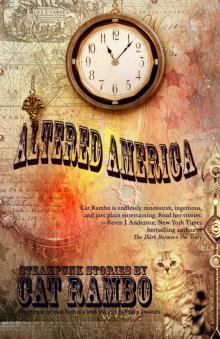 Altered America
Altered America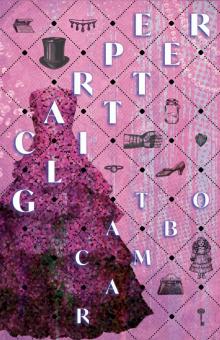 Carpe Glitter
Carpe Glitter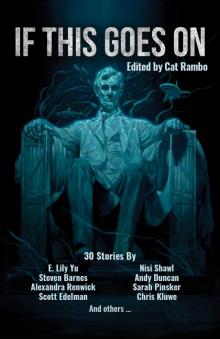 If This Goes On
If This Goes On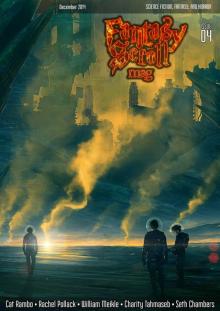 Fantasy Scroll Magazine Issue #4
Fantasy Scroll Magazine Issue #4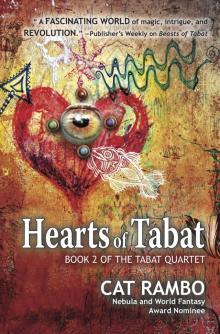 Hearts of Tabat
Hearts of Tabat Beneath Ceaseless Skies #151
Beneath Ceaseless Skies #151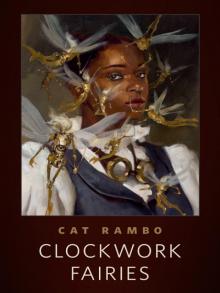 Clockwork Fairies
Clockwork Fairies Beneath Ceaseless Skies #170
Beneath Ceaseless Skies #170 Sugar
Sugar Near + Far
Near + Far Eyes Like Sky And Coal And Moonlight
Eyes Like Sky And Coal And Moonlight